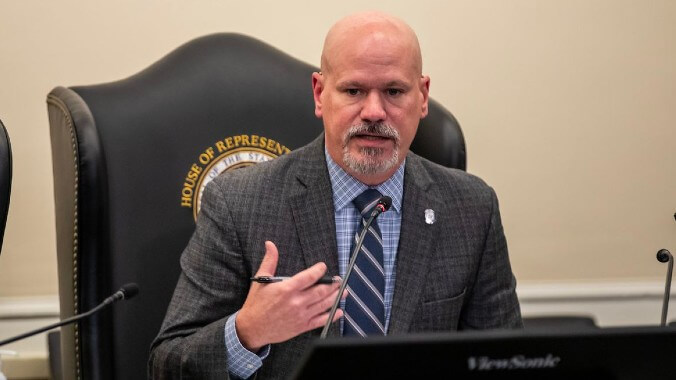Oklahoma Republican Introduces Bill to Ban the Morning-After Pill
Kevin West (R) said the far-right law firm Alliance Defending Freedom helped draft the legislation that targets emergency contraception, which is literal birth control.
Photo: OKHouse.gov Politics
A Republican state representative in Oklahoma recently introduced a bill that would define life as beginning when a sperm fertilizes an egg and would ban the morning-after pill—it could also prevent healthcare providers from prescribing IUDs for emergency contraception. Despite criticism from his colleagues, the bill advanced out of a committee this week by a vote of 5-1. The state already bans abortion except when necessary to save the life of the pregnant person.
Rep. Kevin West (R) said in a hearing Wednesday that he worked with Alliance Defending Freedom—the right-wing Christian law firm that argued Dobbs and has two active abortion cases at the Supreme Court—to author House Bill 3216. The introduction says the bill is, in part, about “prohibiting emergency contraception” and the text says that contraception could be prohibited if it’s prescribed or used “to prevent the implantation of a fertilized egg.” It’s not only incorrect that blocking implantation is tantamount to abortion, but that’s not even how emergency contraception works.
West claimed his intent is to revert OTC emergency contraception pills back to prescription-only, but the plain text of the bill clearly contradicts this. West said he would revise the bill to address bipartisan criticism before the full house hears it sometime next month, but it’s unclear exactly what language he’d change. Still, the fact remains that Republicans, and ADF specifically, are coming for birth control—though it’s pretty wild to see them going for it in an election year.
-

-

-

-

-

-

-

-

-

-

-

-

-

-

-

-

-

-

-

-

-

-

-

-

-

-

-

-

-

-

-

-

-

-

-

-

-

-

-

-








































